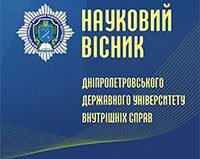Yuriy Kyrychenko, Nataliya Rezanova
Kyrychenko Y., Rezanova N. (2022), Application of foreign experience of the constitutional regulation of the right to work in Ukraine, Scientific Bulletin of Dnipropetrovsk State University of Internal Affairs, №4, 60-65
DOI: 10.31733/2078-3566-2022-4-60-65
ABSTRACT. The article examines the constitutional practice of regulatory regulation of the right to work, enshrined in Art. 43 of the Constitution of Ukraine, and the corresponding norms of the constitutions of European states. There is a well-founded need to set out the specified norm in accordance with the requirements of international human rights documents.
Work is a defining phenomenon of the existence of every person and society as a whole, without which no society existed and cannot exist. Only thanks to the realization of the constitutional right to work, material goods and spiritual values are created, success is achieved in all branches of the economy, and further growth of people is ensured. Therefore, the issue of taking into account foreign experience and adapting national legislation to the requirements of international legal acts, as well as the problem of improving and further researching the constitutional regulation of the right to work in Ukraine, is one of the priority tasks of constitutional and legal science.
It is emphasized that the right to work has been enshrined in almost all the constitutions of European states, except for Sweden, which indicates the impossibility of abandoning its enshrining at the constitutional level in the conditions of a welfare state.
Comparative legal analysis of the provisions of Art. 43 of the Constitution of Ukraine and the corresponding norms of the constitutions of European states testified that the investigated provisions have both common features and certain differences in the ways of expressing this right. In most European countries, the right to work is enshrined in one article of the constitution; in the constitutions of Albania, Bulgaria, Georgia, Spain, Moldova, Germany and Romania, this right is reflected in two articles; in the constitutions of Poland, Montenegro, Portugal and Croatia – in three articles; in the constitutions of Slovakia and the Czech Republic – in four articles, and in the constitutions of Italy and Turkey – in five articles.
It should be noted that the norms of the constitutions of some European states regulate this right in different ways. In particular, in the constitutions of Spain, Italy, Portugal, San Marino, Turkey, and France, in addition to the right to work, the obligation to work is enshrined in one norm. For example, in Art. 49 of the Constitution of Turkey states that «everyone has the right and duty to work», and in Part 2 of Art. 4 of the Italian Constitution establishes that «every citizen … is obliged to carry out activities or perform functions that contribute to the material or spiritual progress of society».
The right to work has a fundamental nature, and therefore all other labor rights derive from it, which are defined in international human rights documents as «fair and favorable working conditions» and as «fair, safe and healthy working conditions».
The provisions of Art. 43 of the Constitution of Ukraine to be laid out in accordance with the requirements of international documents on human rights.
Keywords: constitution, right to work, work, working conditions, forced labor.
References:
- Prava lyudyny : mizhnarodni dohovory Orhanizatsiyi Obʺyednanykh Natsiy ta Rady Yevropy [Human rights: international treaties of the United Nations and the Council of Europe] / Uporyad.: V. Pavlyk, V. Teslenko. Kyiv : Fakt, 2001. 152 p. [in Ukr.].
- Protsevsʹkyy, O. (1999) Novyy zmist prava na pratsyu – osnova reformuvannya trudovoho zakonodavstva Ukrayiny [The new content of the right to work is the basis of reforming the labor legislation of Ukraine]. Pravo Ukrayiny. № 6, pp. 101-105. [in Ukr.].
- Andriyiv, V. (2007) Pryrodnyy kharakter trudovykh prav pratsivnykiv [Natural character of employees’ labor rights]. Pravo Ukrayiny, № 4, pp. 67-70. [in Ukr.].
- Moldovan, V. V. (2012) Konstytutsiyni prava, svobody ta obovʺyazky lyudyny i hromadyanyna [Constitutional rights, freedoms and duties of the man and a citizen] : navch. posibnyk. Kyiv : Tsentr uchbovoyi literatury, 206 p. [in Ukr.].
- Konstitutsyya Turetskoy Respubliki ot 7 noyabrya 1982 g. [Constitution of the Republic of Turkey of November 7, 1982]. URL : http://www. legalns.com. [in Russ.].
- Konstitutsyya Italyanskoy Respubliki ot 22 decabrya 1947 g. [Constitution of the Italian Republic of December 22, 1947]. URL : http://www.regione.toscana.it. [in Russ.].
- Kodeks zakoniv pro pratsyu Ukrayiny vid 10 hrudnya 1971 r. [Code of Labor Laws of Ukraine of December 10, 1971]. Vidomosti Verkhovnoyi Rady Ukrayinsʹkoyi RSR. 1971. Appendix to № 50, art. 375. [in Ukr.].
- Konventsyi i rekomendatsyi, prinyatyye Mezhdunarodnoy konferentsyyey truda [Conventions and recommendations adopted by the International Labor Conference]. 1919-1956: Vol. 1 Mezhdunarodnoye Byuro Truda. Zheneva, 1991. [in Russ.].
- Velykyy tlumachnyy slovnyk suchasnoyi ukrayinsʹkoyi movy [A large explanatory dictionary of the modern Ukrainian language] / Uklad. i holov. red. V. T. Busel. Kyyiv ; Irpinʹ : VTF «Perun», 2001. 1440 p. [in Ukr.].
- Pro oplatu pratsi [On wages] : Zakon Ukrayiny vid 24.03.1995. Vidomosti Verkhovnoyi Rady Ukrayiny. 1995. № 17, art. 121. [in Ukr.].
- Pro orhanizatsiyu trudovykh vidnosyn v umovakh voyennoho stanu [On the organization of labor relations under martial law] : Zakon Ukrayiny vid 15.03.2022. URL: http://www.rada.gov.ua. [in Ukr.].
- Konstitutsyya Gruzii ot 24 avgusta 1995 g. [Constitution of Georgia of August 24, 1995]. URL : http://matsne.gov.ge. [in Russ.].
- Kozub, H. (2007) Pravo invalida na pratsyu yak pryrodne pravo ta konstytutsiynyy pryntsyp [The right of a disabled person to work as a natural right and a constitutional principle]. Yurydychna Ukrayina. № 11, pp. 52-57. [in Ukr.].
